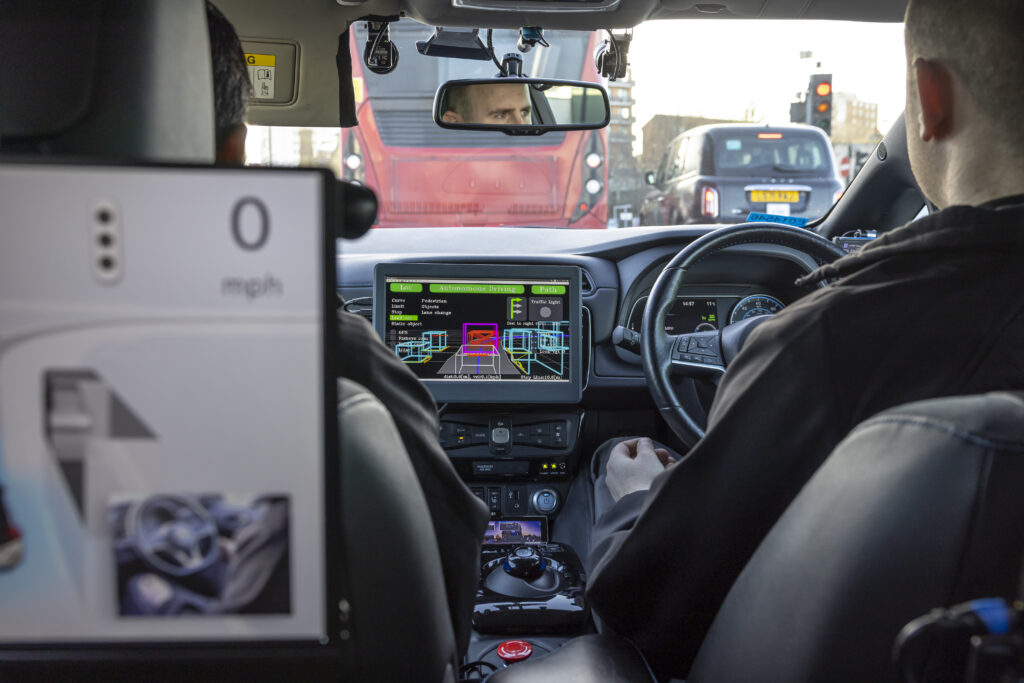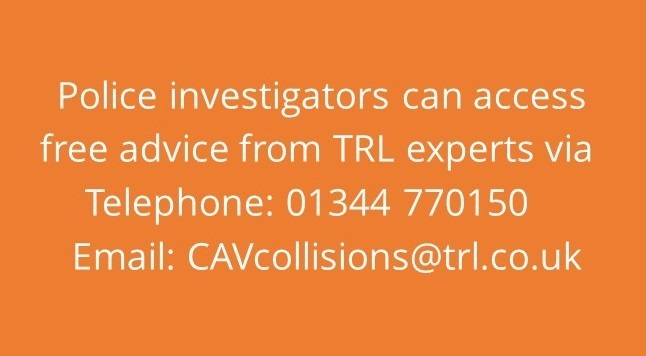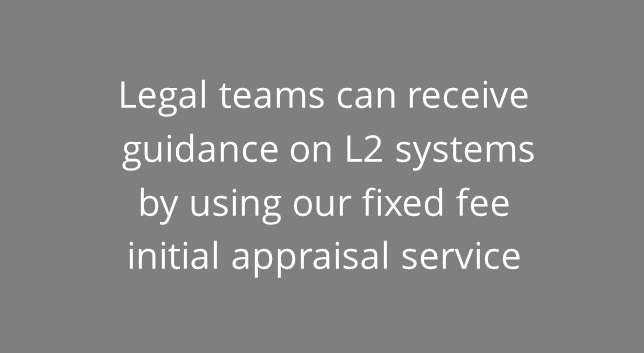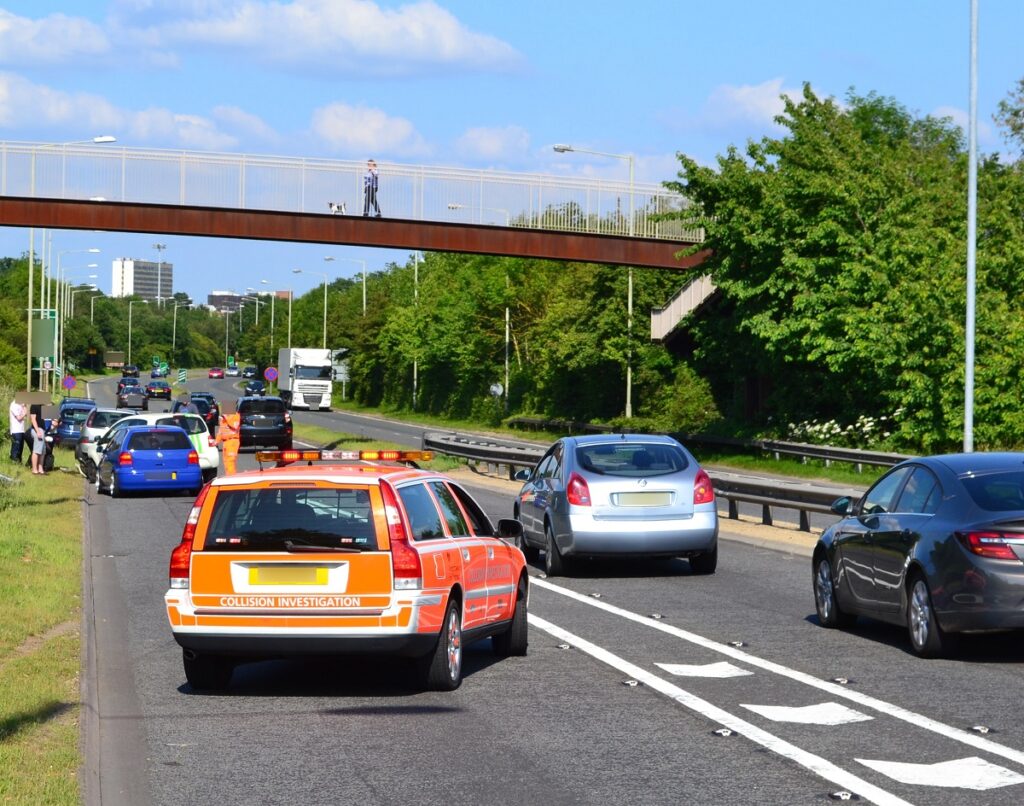A dedicated email and telephone support service to assist police offers attending a collision scene involving highly or fully automated vehicles.

Whist connected automated vehicles (CAV) might not be ready for unconstrained use today in the UK, the rate of development in this field is such that technologies which make vehicles capable of operating at a safer level than human drivers are not too far away.
With trials of automated technologies happening already on public roads in the UK, the widespread adoption of ‘Level 2’ automation through advanced driver support functions and the expected arrival of highly automated ‘Level 3’ Automated Lane Keeping Systems (ALKS) in new cars in the near future, it is inevitable that collisions involving these vehicles will occur. When they do, investigators will need to access new sources of evidence and ask new questions.
TRL is the author of the CAV collision investigation guidance currently held on the National Crime Agency’s (NCA’s) intranet, and regularly updates the National Roads Policing Operations & Intelligence Forum (NRPOI) with information about CAV technologies and their introduction into the UK vehicle parc, and any active CAV trials on public roads.
The Department for Transport is funding a dedicated email and telephone support service – provided by TRL – to assist police offers attending a collision scene involving highly or fully automated vehicles, or when preparing a post-collision report. TRL experts are on hand to help the police build up a knowledge base to respond to different types of incidents.
For instance, if the vehicle is part of a prototype or technology development trial, investigators will need to establish:
- Whether the test driver or remote operator was in charge of the vehicle and whether they could, or should, have prevented the collision;
- The trial operator’s approach to management of safety risk (their safety assurance plan), the mitigations in place for conducting safe trials on public roads and their compliance with the plan;
- Whether fault or failure of the automated vehicle system in use caused or contributed to the incident.
Police investigators can access free advice from TRL experts via
Telephone: 01344 770150 or Email: CAVcollisions@trl.co.uk
Telephone advice is available 9am -5pm Monday to Friday (upto 1 hour of free time). Enquiries by email will receive a response on the same day. Further assistance may be provided if required, funded by DfT.
Today there are many vehicles on the road with ‘Level 2’ advanced driver support functions (such as Volvo’s Pilot Assist, Ford’s BlueCruise and Tesla’s Autopilot). In its simplest form a Level 2 system comprises a combination of adaptive cruise control and lane centring assistance; these two systems use throttle and steering controls to maintain speed or a minimum gap to traffic ahead and to follow the lane in which the vehicle is driving. These systems require drivers to remain focused on the driving task, monitor traffic around them and be ready to take control immediately, if required. Where vehicles with ‘Level 2’ systems are involved in collisions it is relevant to understand whether the driver support functions were operating at the time of a collision, and whether driver over-reliance on these systems may have contributed to a collision.
When ‘Level 3’ vehicles are approved for use on UK roads, drivers will be able to hand over driving to the vehicle’s automated driving system and perform other tasks (on certain roads). In the case of Level 3 vehicles, either the automated driving system or the driver may have been in control of the vehicle at the time of a collision. Police will very quickly need to become confident in identifying ALKS vehicles and accessing data from the vehicle’s data storage system for automated driving (DSSAD). All automated vehicle systems approved by the Secretary of State for Transport will have a DSSAD, which will record the status of the automated driving system at the time of a collision and other relevant data.
If an automated system was active at the time of a collision the question of whether the system performed as expected or as designed will arise, along with questions such as:
- should the vehicle have avoided the collision?
- why did it not?
- if it had performed as expected would the circumstances or outcomes have been different?
The data captured by the DSSAD will not assist the investigator with all relevant questions; thus investigators will need to employ both traditional collision investigation methods and to access other sources of data from the vehicle and operator responsible for the automated driving system.
There are no Level 3 vehicles approved to operate in the UK at the moment. When they are approved, they will be listed here: https://www.gov.uk/guidance/self-driving-vehicles-listed-for-use-in-great-britain.
There is a huge – global – effort going on right now to understand and develop the methods and processes through which CAV technologies can be tested, verified and authorised to operate on public roads. The UK is proactively invested in encouraging CAV development because of the potential benefits it can deliver to society, including:
Safety – generally humans are pretty good at driving, however, 95% of all collisions have some contribution by the human driver
Efficiency – automated and co-operative fleets will operate at optimal levels as transport networks and will have a lower carbon footprint
Economic opportunity – businesses which can enable automated vehicles to operate safety in public environments could significantly reduce the costs of transportation, be they self-driving taxis or driverless delivery vans.
Collecting data about the ‘in-service’ performance of CAV technologies in real-world collisions is a key part of this evolution; by understanding scenarios in which approved automated systems failed to avoid collisions we will create evidence to inform improved testing and development and regulatory regimes for the next generation of automated systems.
This service is provided to police investigators as part of TRL’s delivery of the RAIDS programme.
Legal teams handling a case involving an automated vehicle can receive guidance by requesting an initial appraisal for a fixed fee.



